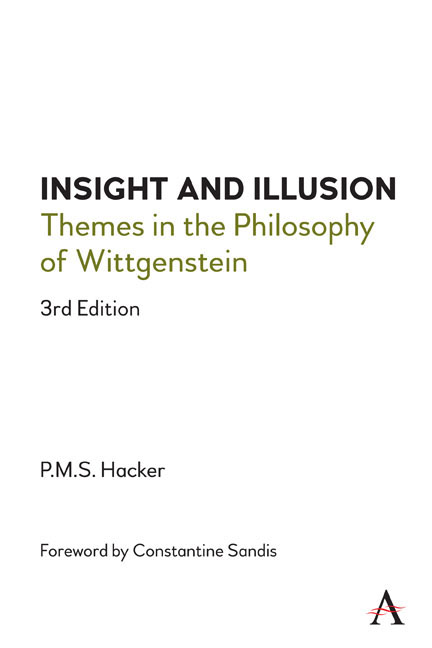Book contents
- Frontmatter
- Dedication
- Contents
- FOREWORD
- PREFACE TO THE REVISED EDITION
- PREFACE TO THE FIRST EDITION
- LIST OF ABBREVIATIONS
- I WITTGENSTEIN’S EARLY CONCEPTION OF PHILOSOPHY
- II THE DIALOGUE WITH FREGE AND RUSSELL
- III MEANING, METAPHYSICS, AND THE MIND
- IV EMPIRICAL REALISM AND TRANSCENDENTAL SOLIPSISM
- V DISINTEGRATION AND RECONSTRUCTION
- VI WITTGENSTEIN’S LATER CONCEPTION OF PHILOSOPHY
- VII METAPHYSICS AS THE SHADOW OF GRAMMAR
- VIII THE REFUTATION OF SOLIPSISM
- IX PRIVATE LINGUISTS AND PUBLIC SPEAKERS
- X ‘A CLOUD OF PHILOSOPHY CONDENSED INTO A DROP OF GRAMMAR’
- XI CRITERIA, REALISM AND ANTI-REALISM
- INDEX
VI - WITTGENSTEIN’S LATER CONCEPTION OF PHILOSOPHY
Published online by Cambridge University Press: 24 February 2022
- Frontmatter
- Dedication
- Contents
- FOREWORD
- PREFACE TO THE REVISED EDITION
- PREFACE TO THE FIRST EDITION
- LIST OF ABBREVIATIONS
- I WITTGENSTEIN’S EARLY CONCEPTION OF PHILOSOPHY
- II THE DIALOGUE WITH FREGE AND RUSSELL
- III MEANING, METAPHYSICS, AND THE MIND
- IV EMPIRICAL REALISM AND TRANSCENDENTAL SOLIPSISM
- V DISINTEGRATION AND RECONSTRUCTION
- VI WITTGENSTEIN’S LATER CONCEPTION OF PHILOSOPHY
- VII METAPHYSICS AS THE SHADOW OF GRAMMAR
- VIII THE REFUTATION OF SOLIPSISM
- IX PRIVATE LINGUISTS AND PUBLIC SPEAKERS
- X ‘A CLOUD OF PHILOSOPHY CONDENSED INTO A DROP OF GRAMMAR’
- XI CRITERIA, REALISM AND ANTI-REALISM
- INDEX
Summary
A Kink in the Evolution of Philosophy
The two conceptions of philosophy in the Tractatusbear considerable affinities to Wittgenstein's later conception which evolved from 1929 onwards and found its final and polished expression in the Philosophical Investigations.There are also, however, deep differences which lie concealed in his semi-ironical use of similar remarks in both works. His oracular epigrammatical style lends itself to ambiguity. His liking for such masters of irony, paradox, and pun, as Lichtenberg, Kierkegaard, and Kraus should be a warning to the superficial reader. His repetition of Tractatusdicta frequently constitutes the re-employment of old bottles to hold new wine. The author of the Tractatushad, in the opinion of the author of the Investigations,succumbed to many kinds of deep philosophical illusion. On the flyleaf of Schlick's copy of the Tractatus,Wittgenstein is reported to have written: ‘Jeder dieser Satze ist der Ausdruck einer Krankheit'. (Each of these sentences is the expression of a disease.) The general conception of philosophy was accordingly distorted on many matters, necessitating reinterpretation and correction. Any attempt to trace out continuity and contrast between the earlier and later work with respect to the conception of philosophy must bear in mind the fact that the axis of reference of the whole investigation has been rotated around a fixed point (PI,§108). The need to grasp conceptual structures remains, but they are now conceived sub specie humanitatis.
In the course of the lectures in 1930-3 Wittgenstein claimed that philosophy as he was now practising it was not merely a stage in the continuous development of the subject, but a new subject (M, p. 322). Using a simile reminiscent of Russell's claims about logical analysis, Wittgenstein declared that with the emergence of his new style of philosophizing there was a ‘kink’ in the evolution of philosophy comparable to that which occurred when Galileo invented dynamics. He repeated the point in the Blue Book (BB,p. 28). His work, he wrote, is one of the heirs of the subject that used to be called philosophy. The important thing, he claimed in his lectures, was not whether his results were true or false, but that a new method had been found, as had happened when chemistry was developed out of alchemy.
- Type
- Chapter
- Information
- Insight and IllusionThemes in the Philosophy of Wittgenstein, pp. 146 - 178Publisher: Anthem PressPrint publication year: 2021

